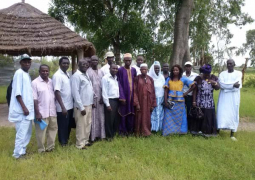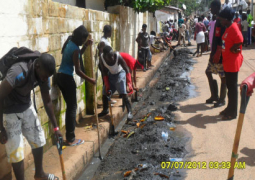The
National Centre for Arts and Culture (NCAC), in collaboration with UNESCO,
recently started a five-day workshop to review and update the management plan
of the Stone Circles of the Senegambia.
The
opening ceremony held at the National Museum premises in Banjul was witnessed
by the Minister of Tourism and Culture, heritage experts from Senegal and
participants from both The Gambia and Senegal.
Speaking
at the opening ceremony, Baba Ceesay, director general of NCAC, said the
workshop was a manifestation of the inalienable links that bind the two
countries, Gambia and Senegal, and the Stone Circles are one such phenomenon.
He
said the five-day workshop was the subject of the world heritage convention,
which recognises monuments and sites of outstanding universal significance, and
places them in the prestigious world heritage list.
He
added that the Stone Circles were inscribed in the list in 2006, with two sites
from Senegal (Wanar, Sine Ngayen) and two from Gambia (Wassu, Kerr Batch).
For
a site to be inscribed in the list, it must fulfill one or more of ten criteria
established by the world heritage operational guidelines, including the test of
authenticity and integrity, which Ceesay said had been fulfilled by the two
countries.
“The
main objective of the workshop is to review the old plan, it’s successes and
failures, and craft a new plan in the light of new developments.”
Declaring
the workshop open, the Minister of Tourism and Culture, Hon. Hamat Bah, said
now that the 2005-2009 management plan is expired, a new one is long overdue,
and this was to kick-start the consultative processes needed to have a new
management plan for the sites.
He
said one of the non-negotiable conditions is that all UNESCO world heritage
sites have to fulfill periodically an updated management plan, which would show
how the site would be managed.
It
also to show how communities would be involved in the management and
conservation of the site, and what is the role of government in the management
of the sites.
Minster
Bah added that the project is to be implemented in two phases, adding that the
first phase is the workshop in Banjul and the second phase will take the form
of a workshop in Dakar, in April 2017 where the features and contents of the
plan will be finalised.
Abdul
Aziz Guisse, current director of the Department of Cultural Heritage in
Senegal, thanked the Minister and NCAC for cooperating with them in the
project.
He
said the four sites were selected due to the fact that they are the most
significant sites for both countries, while thanking UNESCO for involving the
communities in the process.
Read Other Articles In Article (Archive)




